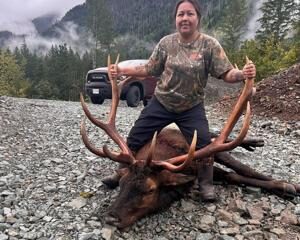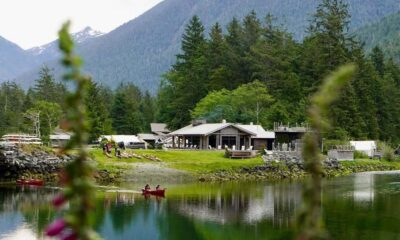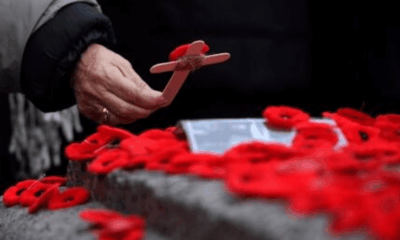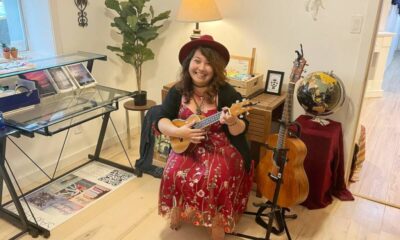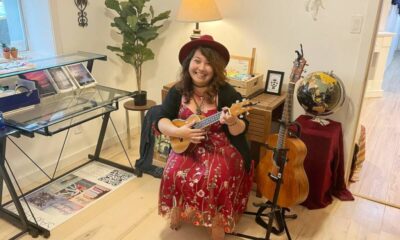Lifestyle
Tseshaht Women Harvest Roosevelt Elk, Nourish Their Community
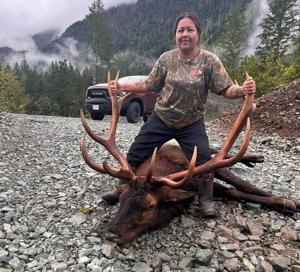
Members of the Tseshaht First Nation, located on Vancouver Island, recently celebrated a significant achievement as two women successfully harvested their first Roosevelt elk this fall. On September 27, 2023, Leisa Hassall shot a four-by-four bull elk in the Comox Main area, while Sylvia Dick followed suit with a seven-by-seven Imperial elk in the Taylor Arm area two days later. The harvest not only represents a personal milestone for both women but also a contribution to their community, as they distribute half of the meat to local families.
Hassall expressed her gratitude and connection to her culture during the hunt, stating, “When I harvest animals, I am always thanking the Creator.” Accompanied by her husband, John Morgan Hassall, and her brother, Jordan Dick, she reflected on the importance of traditional practices in grounding themselves during the hunt. After successfully downing the elk, she made a point to offer thanks for her family and community.
She noted a valuable lesson learned during the experience. “I should have been more careful,” she said, recalling how her excitement led her to approach the animal too soon. “My brother said, ‘Just let him sit,’ but I was too excited.” This moment served as a reminder of the need for caution when hunting large game.
The Tseshaht First Nation receives four elk tags annually, with approximately 30 to 40 members entering the draw. The fortunate winners keep half the meat while the remainder is shared among the community of around 1,267 members. This year marked a first for Dick, who has entered the elk draw for over a decade without success. “I had a feeling this year I was going to get picked, and sure enough, I got picked,” she said, describing her excitement after shooting one of the largest elk she had ever seen.
For both Hassall and Dick, the experience was not just about hunting but also about empowering their community and inspiring others. “It was such an empowering feeling as a Tseshaht woman,” Hassall noted. “Not a lot of us hunt, but we respect each other.” Dick echoed this sentiment, adding, “As soon as I saw the band post that they were handing the meat out to the community, it made me really happy that I could do that for my community.”
Both women come from families with rich hunting traditions. Hassall reminisced about her childhood, where she and her siblings would accompany their grandfathers and fathers on hunting trips. She shared how her love for the activity has been passed down, and she now teaches her own children, including her 11-year-old son, Riley, about the cultural significance and skills involved in hunting.
Preparation for hunting includes not only physical readiness but also mental and spiritual cleansing. “We’re washing away the negative energy. We’re not bringing any bad energy into our hunt,” she said, emphasizing the importance of respecting the land and its resources.
Hassall has managed to store enough elk meat to last her family up to three years, providing a range of options like steaks, roasts, and elk burgers. She described the meat as “lean” and “tender,” and noted that her children appreciate the traditional food, having learned early on about the source of their meals. “He loved catching fish and eating it himself. He loved going on hunts and processing the deer,” she shared about Riley.
Dick, in her generous spirit, distributed the majority of her elk share to around ten families, including more than half to the band. Hassall also made use of the elk’s stomach lining for traditional skincare and gifted the heart to an elder, further emphasizing their cultural practices.
The Roosevelt elk, known as ƛ̓uunim in the Tseshaht language, is the largest land animal on Vancouver Island, with weights exceeding 1,000 pounds. According to the B.C. Ministry of Forests, Lands and Natural Resource Operations, the population of Roosevelt elk is currently stable to increasing, with estimates from 2022 placing the number of elk on Vancouver Island between 5,600 and 6,300.
While the population appears to be healthy, these elk remain vulnerable to unregulated hunting and habitat degradation. The ministry has noted that severe winters, which may become more frequent due to climate change, could adversely affect the elk’s survival rates.
Both Hassall and Dick are looking forward to future hunting seasons, although they must skip next year’s draw due to regulations that prevent members from winning a tag two years in a row. Their recent experiences not only signify personal achievements but also highlight the importance of community and cultural heritage in the Tseshaht First Nation.
-

 Politics1 week ago
Politics1 week agoSecwepemc First Nation Seeks Aboriginal Title Over Kamloops Area
-

 World4 months ago
World4 months agoScientists Unearth Ancient Antarctic Ice to Unlock Climate Secrets
-

 Entertainment4 months ago
Entertainment4 months agoTrump and McCormick to Announce $70 Billion Energy Investments
-

 Lifestyle4 months ago
Lifestyle4 months agoTransLink Launches Food Truck Program to Boost Revenue in Vancouver
-

 Science4 months ago
Science4 months agoFour Astronauts Return to Earth After International Space Station Mission
-

 Technology3 months ago
Technology3 months agoApple Notes Enhances Functionality with Markdown Support in macOS 26
-

 Top Stories1 month ago
Top Stories1 month agoUrgent Update: Fatal Crash on Highway 99 Claims Life of Pitt Meadows Man
-

 Sports4 months ago
Sports4 months agoSearch Underway for Missing Hunter Amid Hokkaido Bear Emergency
-

 Politics3 months ago
Politics3 months agoUkrainian Tennis Star Elina Svitolina Faces Death Threats Online
-

 Politics4 months ago
Politics4 months agoCarney Engages First Nations Leaders at Development Law Summit
-

 Technology4 months ago
Technology4 months agoFrosthaven Launches Early Access on July 31, 2025
-

 Top Stories3 weeks ago
Top Stories3 weeks agoFamily Remembers Beverley Rowbotham 25 Years After Murder

